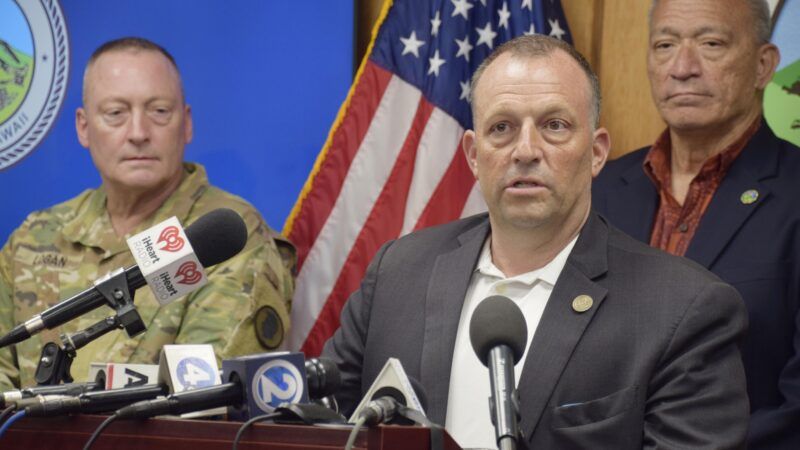Hawaii Gov. Josh Green Backtracks on YIMBY Emergency Order
In the face of lawsuits and accusations of attempted "genocide," Green is restoring many homebuilding regulations he suspended in July.

Facing a storm of criticism—and lawsuits—Hawaii Gov. Josh Green is reversing substantial portions of his emergency suspension of homebuilding regulations.
The revised proclamation, issued on Friday, restores environmental reviews, historic preservation laws, and state zoning regulations that had been paused by the governor in July, Honolulu Civil Beat reports.
"My intention long before the emergency proclamation has always been to find a pathway to build housing and to honor our traditions of environmental protection and culture," the Democratic governor told Civil Beat. "I never intended anything except to build housing we need."
The state chapters of the Sierra Club and the American Civil Liberties Union, as well as Native Hawaiian cultural groups, sued the governor and members of his administration earlier this month. They described his replacement of environmental and historic preservation rules, which play a role in preserving Native Hawaiian burial sites, with a more streamlined process as attempted "genocide" and "dictatorship."
In addition to restoring those laws, Green is reorganizing a controversial Beyond Barriers Working Group. He created the group to determine whether individual housing and infrastructure projects should get relief from a range of additional regulations, including local zoning laws, impact fees, and taxes.
Nani Medeiros, chair of the working group, announced she would resign earlier this month, citing the negative comments she and her family had received from opponents of the governor's order.
The reorganized board will be led by a triumvirate of state housing officials.
"I can't stand the housing crisis we're in and have been in for decades. Our regulatory processes are considered some of the worst in the nation," said Medeiros in a statement obtained by Civil Beat. "Threats have been made against me, loved ones who don't even work for the government, and even children. I love my family, and for the sake of their health and safety, I've been left with no choice but to resign from my position."
The governor is also excluding Lahaina, the Maui community destroyed by July wildfires, from the new proclamation.
The governor's new order still allows authorities to waive local development regulations, impact fees, and collective bargaining arrangements. (The latter would be suspended while third-party permit reviewers are hired.)
The changes are nevertheless a major retreat from the sweeping provision of Green's previous order.
The governor has justified the reversal by saying that he doesn't "think war over process is going to help anybody." Yet the premise of his original proclamation was that Hawaii's process for approving new development was the primary reason for Hawaii's low rates of building and highest-in-the-nation housing costs.
The preamble to his latest proclamation still says that "a critical barrier to the speedy development of housing is the lengthy, cumbersome, and antiquated regulatory process." It notes that more than a dozen state and county studies commissioned since 1991 have recommended regulatory streamlining.
If you want to make progress on Hawaii's housing shortage, war over the process is inevitable. And it's a war Green could likely win, at least in the courts.
The emergency statute that the governor is using to justify his housing proclamation gives him "sole" authority to decide what counts as an emergency. The law also directs courts to interpret the statute in favor of the governor's exercise of emergency powers.
Federal courts rejected numerous legal challenges to the former governor's far more invasive emergency orders during COVID-19.
"There is little in the emergency management statute that constrains the governor's powers during an emergency period," concludes a 2021 report by the pro-market Grassroot Institute.
That is to say, it's probable that Green's housing proclamation would withstand the lawsuits already filed against it.
Rather than hold the line, Green is voluntarily choosing to retreat.
The immediate effect of the governor's reversal will be to defang the parts of his order mostly likely to expedite housing development. In the longer term, he's emboldening supporters of Hawaii's current burdensome regulatory regime.
Green's housing proclamation was controversial even among people who support its deregulatory thrust: Even if the governor was making the right decisions, he was still intruding on the legislature's sphere.
By keeping the emergency proclamation in place while neutering its overall effect, Green is not mollifying these critics.
"From necessary evil to worst of both worlds: Before, the question was whether abusing the emergency power could be tolerated in order to fast-track housing," tweeted Pacific Legal Foundation attorney Robert Thomas. "Now, however, all this is…an abuse of the emergency power that won't fast-track housing."
Rent Free is a weekly newsletter from Christian Britschgi on urbanism and the fight for less regulation, more housing, more property rights, and more freedom in America's cities.


Show Comments (26)